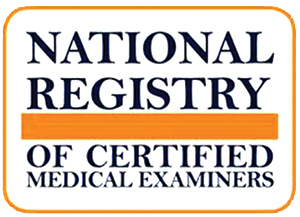Menu
DOT Medical
Exams
A better way to ensure that you're on the road

We bring the DOT exam to you
Have your DOT physical in the convenience of your home, today.
Our mobile medical van will drive to your home or office and perform your DOT Medical Exam. We also provide IV Hydration Therapy in the comfort of your home to keep you rested and rejuvenated for your next haul.
Your overall health and wellness are crucial, especially when you spend long hours on the road. We focus on the total health and well-being of the truck driver by providing essential primary care services such as blood pressure management, and diabetes management via telehealth visits and IV Hydration through the mobile clinic.
Why Choose Us
DO You
- Need a DOT physical?
- Only trust licensed proffesionals with your medical need
- Value your personal time while not on the road?
DON'T want to:
- Wait in long lines at a clinic or doctor’s office for hours to be seen?
- Take time off work to get your DOT physical done?
- Drive around looking for a clinic to do your same-day DOT exam?
We've got the solution for you.
FAQ
You will need a DOT physical if you:
- Drive a vehicle designed to carry more than 15 people.
- Are paid to drive a vehicle designed to carry more than 8 people.
- Carry hazardous material in your vehicle that requires your vehicle to have a placard.
- Drive a vehicle on the interstate with a gross combination weight rating, gross vehicle weight rating, or gross combination weight of over 10,000 pounds.
The health care provider who performs your DOT physical will ask you detailed questions about your medical history, including:
You will have a hands-on physical that includes checking your:
You’ll also have to have a urinalysis to check for protein, blood, sugar, and specific gravity. These tests can tell your doctor if you need additional tests to check for other medical problems. You may also have to have other tests if your doctor thinks they’re necessary.
- If you’ve ever had surgery
- Any medicines you’re taking, including prescription and over-the-counter medicines
- Any health problems you’ve had
- If you use tobacco, alcohol, or illegal substances
- If you’ve ever failed a drug test
- If you’ve ever been dependent on an illegal substance
- Any symptoms you’re currently having
You will have a hands-on physical that includes checking your:
- Height
- Weight
- Blood pressure
- Vision
- Hearing
- General appearance
- Skin
- Eyes
- Ears
- Mouth and throat
- Heart
- Lungs and chest
- Abdomen
- Back and spine
- Genital and urinary system, including checking for hernias
- Extremities and joints
- Nervous system, including your reflexes Gait, which is how you walk
- Circulatory system, which is your arteries, veins, and lymphatic system
You’ll also have to have a urinalysis to check for protein, blood, sugar, and specific gravity. These tests can tell your doctor if you need additional tests to check for other medical problems. You may also have to have other tests if your doctor thinks they’re necessary.
DOT Physicals can only be performed by health care professionals who are certified by the FMCSA. You can search for a licensed medical examiner here. Licensed medical examiners may be:
Doctors of medicine (MD)
Doctors of osteopathy (DO)
Physician assistants (PA)
Doctors of chiropractor (DC)
Advanced practice nurses (APN)
You can fill out the driver’s portion of the exam at home if you want to save time on the day of the physical. You will also need to bring:
- A list of all of your doctors’ names and addresses
- A list of all of your medicines, including the dosage
- Your glasses, contacts, or hearing aids, if you use them
- A record of your blood sugar readings and your most recent Hgb A1C if you have diabetes
- A record from your CPAP machine showing proper use for at least 90 days if you have sleep apnea
- A letter from your cardiologist indicating you’re safe to drive a DOT physical if you have heart issues
- The results of recent heart tests, if you’ve had them
- A letter from your neurologist if you’ve had a stroke, a brain tumor, seizure disorder, or bleeding in the brain
- A letter and medical records from your doctor if you’re taking any medicines that can cause sleepiness or are controlled substances
- A letter from your doctor if you’ve lost permanent use of an arm or leg, including any work restrictions
- A letter from your doctor and a recent blood level and clearance test if you’re taking the blood thinner Coumadin
Conditions that may disqualify you from passing a DOT physical are those that interfere with your ability to drive safely. If something affects your hearing or vision, it could cause you to have an accident. You also may not be safe to drive if you have a condition that could cause you to lose consciousness or become dizzy. Such conditions can include:
- Uncontrolled or unstable heart conditions
- Epilepsy or seizure disorders
- Meniere’s disease, an inner ear disorder that causes dizziness
- Uncontrolled diabetes
- Uncontrolled high blood pressure
- Vision loss that can’t be corrected
- Hearing loss that can’t be corrected
- Use of marijuana, even if prescribed
- Use of illegal substances
- Use of oxygen therapy
- Some respiratory conditions
- Protein in the urine, which may indicate kidney disease
